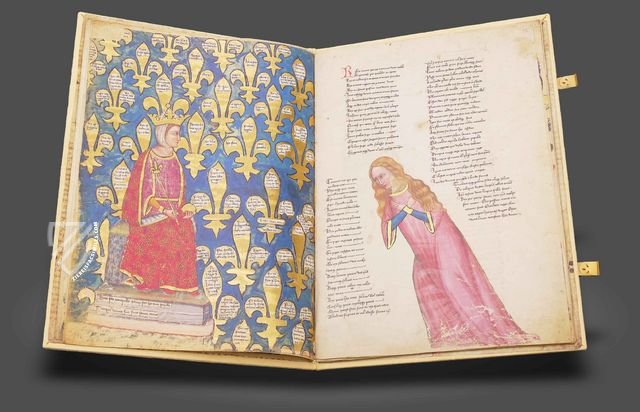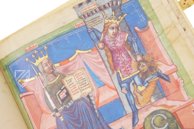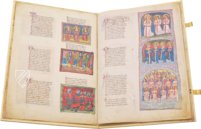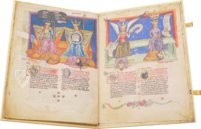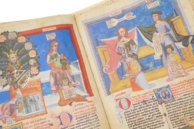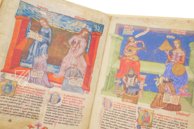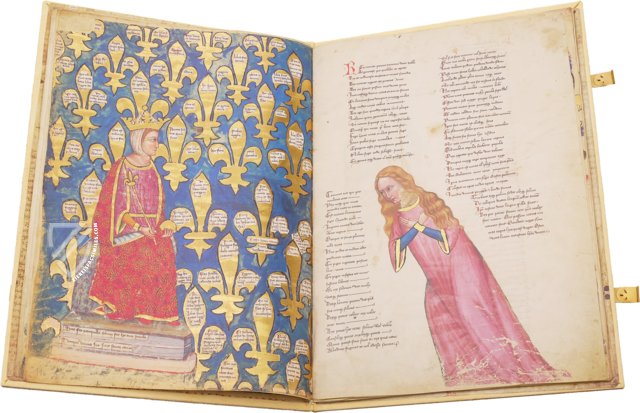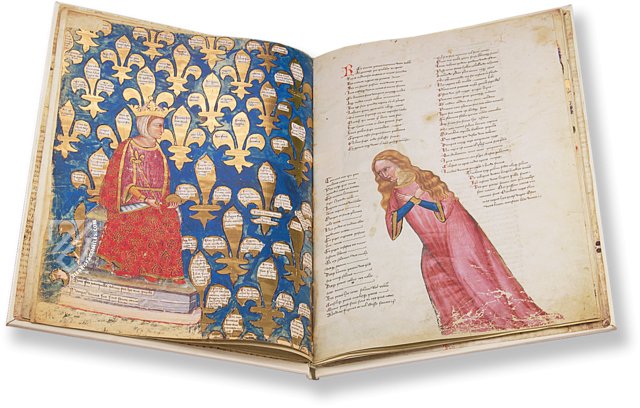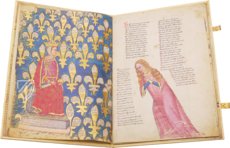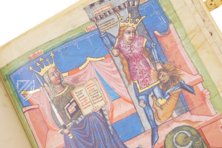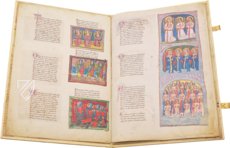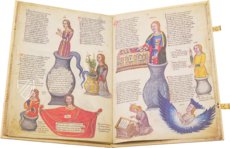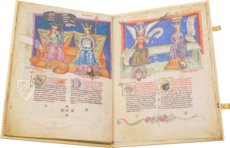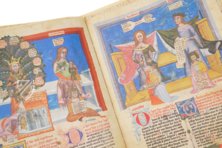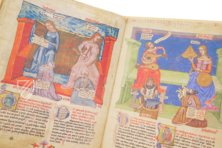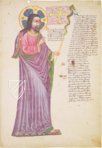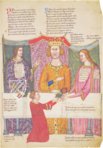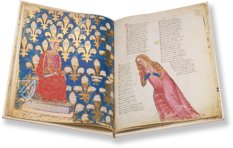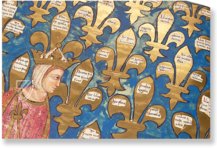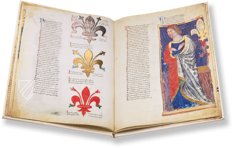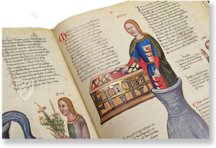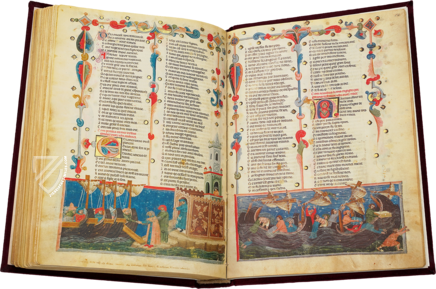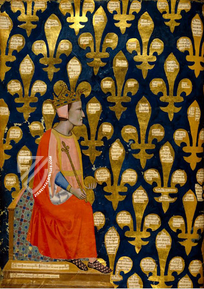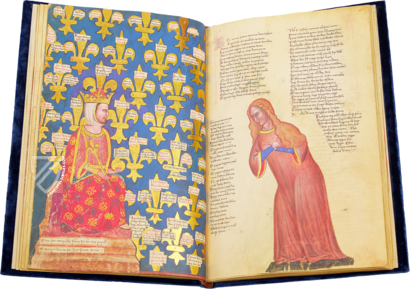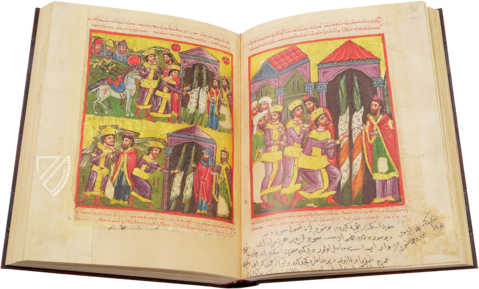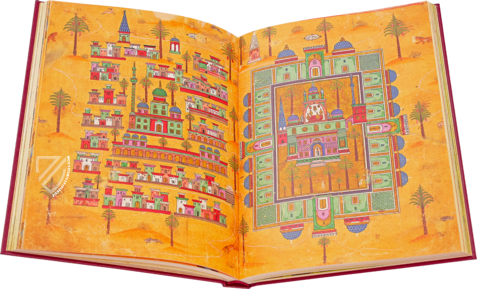Poem of Praise for King Robert of Anjou
(3,000€ - 7,000€)
The situation in 14th-century Italy is not very promising: the country is torn apart, the pope is in Babylonian exile in faraway Avignon, and Roman-German kings often stake their claim to the land. Could Robert of Anjou (1278-1343), the king of Naples, be the man to turn everything around? The author of the present panegyric is firmly convinced: Robert is the only one, he is effusively praised as the one who can unite Italy and save the Church. The dignity and importance of this statement is supported by the unusual format (48.5 x 34.4 cm) and the 43 monumental miniatures, which cleverly invite the viewer to an almost intimate dialogue. Politically and militarily, Robert was not as successful as the eulogy might lead one to believe, but he bears the epithet Il Saggio, “the Wise”: he generously patronized Giotto di Bondone, Francesco Petrarch, and Giovanni Boccaccio.
Poem of Praise for Robert of Anjou
The Poem of Praise for Robert of Anjou, King of Naples (1278–1343) is in the safe keeping of the Austrian National Library and is one of the most important documentations concerning the medieval conception of good government and at the same time also one of the most outstanding examples of illumination from the 14th century.
Decor Worthy of a King
This extraordinary codex was illustrated by 43 large-format miniatures, richly endowed with engraved gold and silver, on 72 pages altogether. The partially full-page miniatures make an impression with their monumental format of handwriting (48.5 x 34.4 cm); 29 Florentine initials and 8 opaque initials on a gold background complement this fantastic layout. A kaleidoscope of almost the entire medieval/early-modern educational canon is covered. Thus, the manuscript is a testimony to the extravagant intellectual and artistic effort which was expended for the sake of depicting the Kingdom of Robert of Anjou. Some of the handwriting also indicates that Robert himself commissioned production of the manuscript.
The Content – Manifesto and Legacy
The Poem of Praise for King Robert of Anjou portrays the King as the ideal ruler, who is alone able to keep Italy under rule. This was a period of time during which Italy is torn apart: Robert shall, as the future ruler, bring the affairs of Italy in order. The author laments that Italy does not have a king like other states; likewise he denounces the absence of the Popes of Rome during their “Babylonian” exile in Avignon (1309–1376).
A Splendiferous Kaleidoscope of the 14th Century
The codex contains two richly illustrated parts. The more extensive first section covers the Poem of Praise (regia carmina) for King Robert of Anjou, which is a praise of the ruler and in usual fashion it represents an effusive poem, which celebrates the addressee as the rescuer of the church and the ideal king of all Italy.
43 Glimmering Miniatures
The miniatures represent the “ideal” government state of Robert: allegories of Italy and the Italian city-states as well as virtues, which praise the King as an ideal ruler. The Italia (the female personification of Italy) or mythological characters from antiquity come before the throne of Robert praying for their country. The King sees himself as the chosen one, ordained by God to fulfill the task of uniting all of Italy. Accordingly, the holy court of God is compared to his own in several splendid miniatures.
Codicology
- Alternative Titles
- Regia Carmina
Das Lobgedicht auf König Robert von Anjou
Panegyric of Robert of Anjou - Size / Format
- 72 pages / 48.5 × 34.4 cm
- Origin
- Italy
- Date
- Ca. 1340
- Epochs
- Style
- Genre
- Language
- Script
- Gothic cursive
- Illustrations
- 43 large miniatures on 72 pages, 37 decorative initials in colors and goldleaf; richly endowed with engraved gold and silver
- Content
- Poem praising Robert of Anjou and calling on him to unite Italy
- Patron
- Robert of Anjou, King of Naples (1278–1343)
Poem of Praise for King Robert of Anjou
The Judgement of Paris
Styled as a medieval feast, this ancient story is central to both the Trojan War as well as the mythological foundations of Rome. It is included in this work as an allusion to King Robert’s ambition to unite all of Italy under his banner. Paris is shown kneeling before the goddesses Hera, Athena, and Aphrodite, all of whom tower over the mortal. Aphrodite is shown accepting the apple from him gracefully, but the displeasure of the other two goddesses is clearly written on their stern faces.
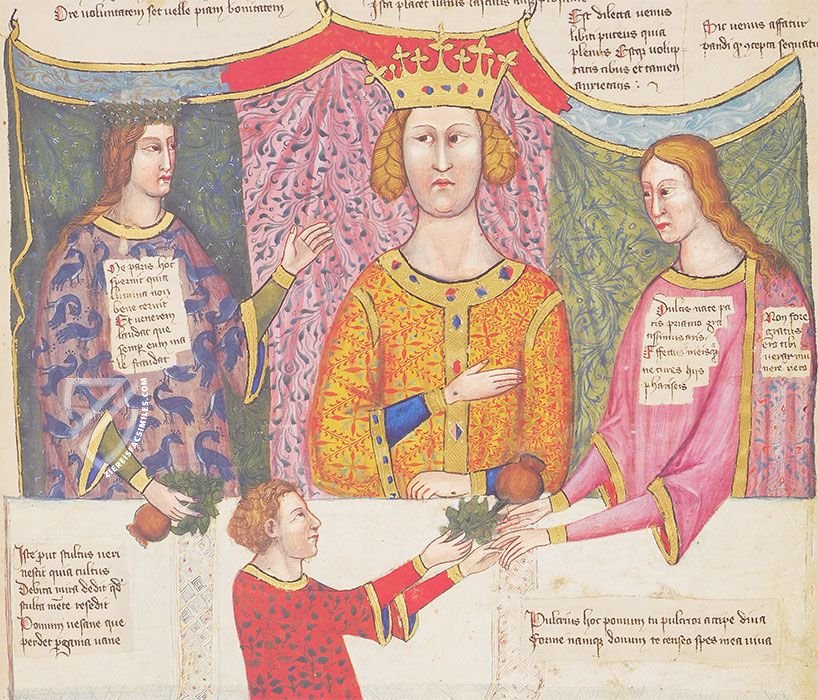
Poem of Praise for Robert of Anjou
Patron Portrait
This double-page at the beginning of the manuscript establishes the purpose of the text – to promote Robert of Anjou, King of Naples, as the savior of Italy. On the recto page, we see the image of a beautiful but sorrowful female figure dressed in pink with dark blue sleeves and accents with gold leaf. She is the personification of Italy, which cries out for a strong leader to unite it.
Robert is depicted in profile on the verso page seated on a bench throne holding an orb in one hand and a scepter topped with a fleur-de-lys in the other. His beautifully patterned robes, trimmed with gold, are contrasted by the lapis lazuli background depicted with a pattern of golden fleur-de-lys, which are inscribed with his numerous virtues.
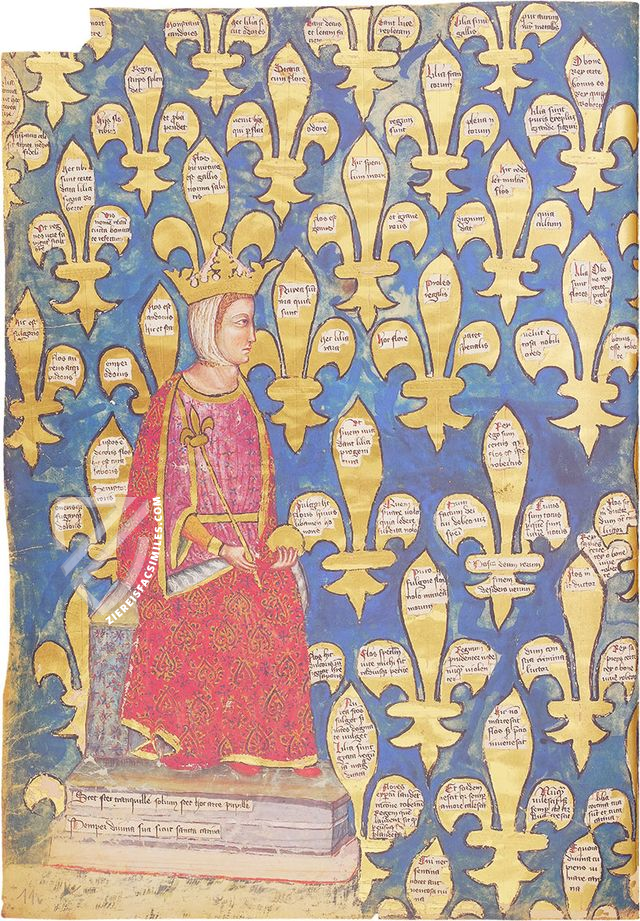
#1 Das Lobgedicht auf Koenig Robert von Anjou (Luxury Edition)
Language: German
(3,000€ - 7,000€)
#2 Das Lobgedicht auf Koenig Robert von Anjou (Normal Edition)
Language: German
(1,000€ - 3,000€)
- Treatises / Secular Books
- Apocalypses / Beatus
- Astronomy / Astrology
- Bestiaries
- Bibles / Gospels
- Chronicles / History / Law
- Geography / Maps
- Saints' Lives
- Islam / Oriental
- Judaism / Hebrew
- Single Leaf Collections
- Leonardo da Vinci
- Literature / Poetry
- Liturgical Manuscripts
- Medicine / Botany / Alchemy
- Music
- Mythology / Prophecies
- Psalters
- Other Religious Books
- Games / Hunting
- Private Devotion Books
- Other Genres
- Afghanistan
- Armenia
- Austria
- Belgium
- Belize
- Bosnia and Herzegovina
- China
- Colombia
- Costa Rica
- Croatia
- Cyprus
- Czech Republic
- Denmark
- Egypt
- El Salvador
- Ethiopia
- France
- Germany
- Greece
- Guatemala
- Honduras
- Hungary
- India
- Iran
- Iraq
- Israel
- Italy
- Japan
- Jordan
- Kazakhstan
- Kyrgyzstan
- Lebanon
- Liechtenstein
- Luxembourg
- Mexico
- Morocco
- Netherlands
- Palestine
- Panama
- Peru
- Poland
- Portugal
- Romania
- Russia
- Serbia
- Spain
- Sri Lanka
- Sweden
- Switzerland
- Syria
- Tajikistan
- Turkey
- Turkmenistan
- Ukraine
- United Kingdom
- United States
- Uzbekistan
- Vatican City
- A. Oosthoek, van Holkema & Warendorf
- Aboca Museum
- Ajuntament de Valencia
- Akademie Verlag
- Akademische Druck- u. Verlagsanstalt (ADEVA)
- Aldo Ausilio Editore - Bottega d’Erasmo
- Alecto Historical Editions
- Alkuin Verlag
- Almqvist & Wiksell
- Amilcare Pizzi
- Andreas & Andreas Verlagsbuchhandlung
- Archa 90
- Archiv Verlag
- Archivi Edizioni
- Arnold Verlag
- ARS
- Ars Magna
- Art Market
- ArtCodex
- AyN Ediciones
- Azimuth Editions
- Badenia Verlag
- Bärenreiter-Verlag
- Belser Verlag
- Belser Verlag / WK Wertkontor
- Benziger Verlag
- Bernardinum Wydawnictwo
- BiblioGemma
- Biblioteca Apostolica Vaticana (Vaticanstadt, Vaticanstadt)
- Bibliotheca Palatina Faksimile Verlag
- Bibliotheca Rara
- Boydell & Brewer
- Bramante Edizioni
- Bredius Genootschap
- Brepols Publishers
- British Library
- C. Weckesser
- Caixa Catalunya
- Canesi
- CAPSA, Ars Scriptoria
- Caratzas Brothers, Publishers
- Carus Verlag
- Casamassima Libri
- Centrum Cartographie Verlag GmbH
- Chavane Verlag
- Christian Brandstätter Verlag
- Circulo Cientifico
- Club Bibliófilo Versol
- Club du Livre
- CM Editores
- Collegium Graphicum
- Collezione Apocrifa Da Vinci
- Comissão Nacional para as Comemorações dos Descobrimentos Portugueses
- Coron Verlag
- Corvina
- CTHS
- D. S. Brewer
- Damon
- De Agostini/UTET
- De Nederlandsche Boekhandel
- De Schutter
- Deuschle & Stemmle
- Deutscher Verlag für Kunstwissenschaft
- DIAMM
- Dropmore Press
- Droz
- E. Schreiber Graphische Kunstanstalten
- Ediciones Boreal
- Ediciones Grial
- Ediclube
- Edições Inapa
- Edilan
- Editalia
- Edition Deuschle
- Edition Georg Popp
- Edition Leipzig
- Edition Libri Illustri
- Editiones Reales Sitios S. L.
- Éditions de l'Oiseau Lyre
- Editions Medicina Rara
- Editorial Casariego
- Editorial Mintzoa
- Editrice Antenore
- Editrice Velar
- Edizioni Edison
- Egeria, S.L.
- Eikon Editores
- Electa
- Emery Walker Limited
- Enciclopèdia Catalana
- Eos-Verlag
- Ephesus Publishing
- Ernst Battenberg
- Eugrammia Press
- Extraordinary Editions
- Fackelverlag
- Facsimila Art & Edition
- Facsimile Editions Ltd.
- Facsimilia Art & Edition Ebert KG
- Faksimile Verlag
- Feuermann Verlag
- Folger Shakespeare Library
- Franco Cosimo Panini Editore
- Friedrich Wittig Verlag
- Fundación Hullera Vasco-Leonesa
- G. Braziller
- Gabriele Mazzotta Editore
- Gebr. Mann Verlag
- Gesellschaft für graphische Industrie
- Getty Research Institute
- Giovanni Domenico de Rossi
- Giunti Editore
- Graffiti
- Grafica European Center of Fine Arts
- Guido Pressler
- Guillermo Blazquez
- Gustav Kiepenheuer
- H. N. Abrams
- Harrassowitz
- Harvard University Press
- Helikon
- Hendrickson Publishers
- Henning Oppermann
- Herder Verlag
- Hes & De Graaf Publishers
- Hoepli
- Holbein-Verlag
- Houghton Library
- Hugo Schmidt Verlag
- Idion Verlag
- Il Bulino, edizioni d'arte
- ILte
- Imago
- Insel Verlag
- Insel-Verlag Anton Kippenberger
- Instituto de Estudios Altoaragoneses
- Instituto Nacional de Antropología e Historia
- Introligatornia Budnik Jerzy
- Istituto dell'Enciclopedia Italiana - Treccani
- Istituto Ellenico di Studi Bizantini e Postbizantini
- Istituto Geografico De Agostini
- Istituto Poligrafico e Zecca dello Stato
- Italarte Art Establishments
- Jan Thorbecke Verlag
- Johnson Reprint Corporation
- Johnson Reprint Corporation
- Josef Stocker
- Josef Stocker-Schmid
- Jugoslavija
- Karl W. Hiersemann
- Kasper Straube
- Kaydeda Ediciones
- Kindler Verlag / Coron Verlag
- Kodansha International Ltd.
- Konrad Kölbl Verlag
- Kurt Wolff Verlag
- La Liberia dello Stato
- La Linea Editrice
- La Meta Editore
- Lambert Schneider
- Landeskreditbank Baden-Württemberg
- Leo S. Olschki
- Les Incunables
- Liber Artis
- Library of Congress
- Libreria Musicale Italiana
- Lichtdruck
- Lito Immagine Editore
- Lumen Artis
- Lund Humphries
- M. Moleiro Editor
- Maison des Sciences de l'homme et de la société de Poitiers
- Manuscriptum
- Martinus Nijhoff
- Maruzen-Yushodo Co. Ltd.
- MASA
- Massada Publishers
- McGraw-Hill
- Metropolitan Museum of Art
- Militos
- Millennium Liber
- Müller & Schindler
- Nahar - Stavit
- Nahar and Steimatzky
- National Library of Wales
- Neri Pozza
- Nova Charta
- Oceanum Verlag
- Odeon
- Omnia Arte
- Orbis Mediaevalis
- Orbis Pictus
- Österreichische Staatsdruckerei
- Oxford University Press
- Pageant Books
- Parzellers Buchverlag
- Patrimonio Ediciones
- Pattloch Verlag
- PIAF
- Pieper Verlag
- Plon-Nourrit et cie
- Poligrafiche Bolis
- Presses Universitaires de Strasbourg
- Prestel Verlag
- Princeton University Press
- Prisma Verlag
- Priuli & Verlucca, editori
- Pro Sport Verlag
- Propyläen Verlag
- Pytheas Books
- Quaternio Verlag Luzern
- Reales Sitios
- Recht-Verlag
- Reichert Verlag
- Reichsdruckerei
- Reprint Verlag
- Riehn & Reusch
- Roberto Vattori Editore
- Rosenkilde and Bagger
- Roxburghe Club
- Salerno Editrice
- Saltellus Press
- Sandoz
- Sarajevo Svjetlost
- Schöck ArtPrint Kft.
- Schulsinger Brothers
- Scolar Press
- Scrinium
- Scripta Maneant
- Scriptorium
- Shazar
- Siloé, arte y bibliofilia
- SISMEL - Edizioni del Galluzzo
- Sociedad Mexicana de Antropología
- Société des Bibliophiles & Iconophiles de Belgique
- Soncin Publishing
- Sorli Ediciones
- Stainer and Bell
- Studer
- Styria Verlag
- Sumptibus Pragopress
- Szegedi Tudomànyegyetem
- Taberna Libraria
- Tarshish Books
- Taschen
- Tempus Libri
- Testimonio Compañía Editorial
- TGB Limited Editions
- Thames and Hudson
- The Clear Vue Publishing Partnership Limited
- The Facsimile Codex
- The Folio Society
- The Marquess of Normanby
- The Richard III and Yorkist History Trust
- Tip.Le.Co
- TouchArt
- TREC Publishing House
- TRI Publishing Co.
- Trident Editore
- Tuliba Collection
- Typis Regiae Officinae Polygraphicae
- Union Verlag Berlin
- Universidad de Granada
- Universitaire Bibliotheken Leiden
- University of California Press
- University of Chicago Press
- Urs Graf
- Vallecchi
- Van Wijnen
- VCH, Acta Humaniora
- VDI Verlag
- VEB Deutscher Verlag für Musik
- Verlag Anton Pustet / Andreas Verlag
- Verlag Bibliophile Drucke Josef Stocker
- Verlag der Münchner Drucke
- Verlag für Regionalgeschichte
- Verlag Styria
- Vicent Garcia Editores
- W. Turnowski Ltd.
- W. Turnowsky
- Waanders Printers
- Wiener Mechitharisten-Congregation (Wien, Österreich)
- Wissenschaftliche Buchgesellschaft
- Wissenschaftliche Verlagsgesellschaft
- Wydawnictwo Dolnoslaskie
- Xuntanza Editorial
- Zakład Narodowy
- Zollikofer AG

